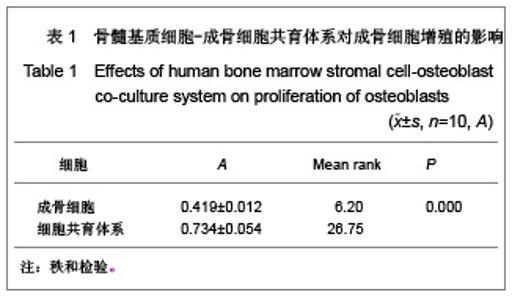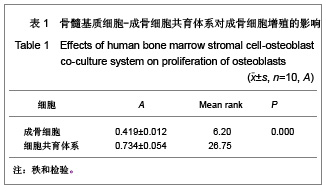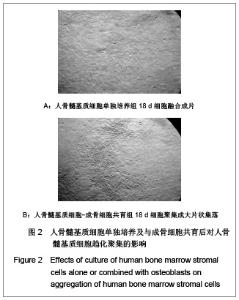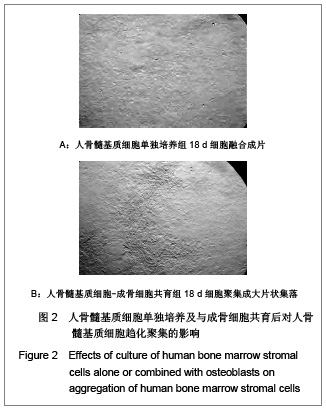| [1] Bing Z, Linlin L, Jianguo Y, et al. Effect of mechanical stretch on the expressions of elastin, LOX and Fibulin-5 in rat BMSCs with ligament fibroblasts co-culture. Mol Biol Rep. 2012; 39(5): 6077-6085.[2] Giuliani N, Bataille R, Mancini C, et al. Myeloma cells induce imbalance in the osteoprotegerin/osteoprotegerin ligand system in the human bone marrow environment. Blood. 2001; 98(13):3527-3533.[3] Zou SP, Wei GW. Zhongguo Linchuang Kangfu. 2005;9(34): 37-39. 邹守平,魏国文.脉冲电磁场在成骨细胞-破骨细胞共育培养体系中的生物学作用[J].中国临床康复,2005,9(34):37-39.[4] Wu MS, Zhao SZ, Li E, et al. Zhongguo Bingli Shengli Zazhi. 2010;26(8):1635-1636. 武密山,赵素芝,李恩,等.抗骨松丹杞颗粒含药血清对成骨-破骨细胞共培养体系中破骨细胞功能的影响[J].中国病理生理杂志,2010,26(8):1635-1636.[5] Yang DH, Wu DL. Zhonghua Guke Zazhi. 2001;21(11):676- 680. 杨德鸿,武大林. 共育体系中成骨细胞和破骨细胞生物学特性观察[J].中华骨科杂志,2001,21(11):676-680.[6] Zhou H, Yang X, Wang N. Tigogenin inhibits adipocytic differentiation and induces osteoblastic differentiation in mouse bone marrow stromal cells. J Mol Cell Endocrinol, 2007;270(1-2):17-22.[7] Tang H, Chen J, Jin D, et al. In vivo ectopic osteogenesis of nacre/polylactic acid artificial bone combined with allogenic osteoblasts. J Zhongguo Xiu Fu Chong Jian Wai Ke Za Zhi. 2005;19(4):114-117.[8] Ryu J, Kim HJ, Chang EJ. Sphingosine 1-phosphate as a regulator of osteoclast differentiation and osteoclast-osteoblast coupling. J EMBO. 2006;13(25): 5840-5851.[9] Yang DH, Jin DD, Chen JT, et al. ZHonghua Guke Zazhi. 2001;21(11):676-680. 杨德鸿,金大地,陈建庭,等.共育体系中成骨细胞和破骨细胞生物学特性观察[J].中华骨科杂志,2001,21(11):676-680.[10] Satija NK, Gurudutta GU, Sharma S, et al. Mesenchymal stem cells: molecular targets for tissue engineering. J Stem Cells Dev. 2007;16(1):7-23.[11] Na K, Kim SW, Sun BK, et al. Osteogenic differentiation of rabbit mesenchymal stem cells in thermo-reversible hydrogel constructs containing hydroxyapatite and bone morphogenic protein-2 (BMP-2).J Biomaterials. 2007;28(16):2631-2637.[12] Edgar CM, Chakravarthy V, Barnes G, et al. Autogenous regulation of a network of bone morphogenetic proteins (BMPs) mediates the osteogenic differentiation in murine marrow stromal cells. J Bone. 2007;40(5):1389-1398. [13] Osyczka AM, Leboy PS. Bone morphogenetic protein regulation of early osteoblast genes in human marrow stromal cells is mediated by extracellular signal-regulated kinase and phosphatidylinositol 3-kinase signaling. J Endocrinology. 2005; 146(8):3428-3437.[14] Wang J, Luo CJ, Guo CH, et al. Mesenchymal stem cells and related factors. J Zhongguo Shi Yan Xue Ye Xue Za Zhi. 2002;10(5):468-471.[15] A Lieb E, Vogel T, Milz S, et al. Effects of transforming growth factor beta1 on bonelike tissue formation in three-dimensional cell culture.II: Osteoblastic differentiation. J Tissue Eng. 2004; 10(9-10):1414-1425.[16] B Kahai S, Vary CP, Gao Y, et al. Collagen, type V, alpha1 (COL5A1) is regulated by TGF-beta in osteoblasts. J Matrix Biol. 2004;23(7):445-455.[17] Owen M. Lineage of osteogenic cells and their relationship to the stromal system. //Peck WA, ed. Bone and mineral research/3. Amsterdam: Elsevier. 1985:1-25.[18] Malaval L, Modrowski D, Gupta AK, et al. Cellular expression of bonerelated proteins during in vitro osteogenesis in rat bone marrow stromal cell cultures. J Cell Physiol. 1994; 158(3): 555-572.[19] Owen ME, Friedenstein AJ. Stromal stem cells: marrow-derived osteogenic precursors. Ciba Found Symp.1988;136:42-60.[20] Linkhart TA, Mohan S, Baylink DJ. Growth factors for bone growth and repair: IGF, TGF beta and BMP.J Bone. 1996;19(1 Suppl):1S-12S.[21] Knutsen R, Honda Y, Strong DD,et al.Regulation of insulin-like growth factor system components by osteogenic protein-1 in human bone cells.J Endocrinology.1995;136(3):857-865. |





